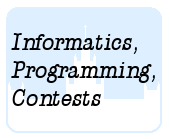Подразделы
Другие разделы
| 1420. Zipper |
| 1421. Bullet Hole |
| 1422. Oblique Cuboid |
| 1423. Quodigious |
| 1424. Tumble Down |
| 1425. Fish Catch |
| 1426. Rack 'em Up |
| 1427. Huffman Code |
Дата и время
27/02/2026 02:45:58
 1428. Infinite Game
1428. Infinite Game
 Infinite Game
Infinite Game
 Элементы теории чисел, диофантовы уравнения
Элементы теории чисел, диофантовы уравненияОлимпиадные задачи на английском языке

| 24/06/2010 | Лето 2010 дорешивание ( 5I) |
| 02/07/2010 | Лето 2010 - 5 (I) |
Ограничения: время – 12s/24s, память – 64MiB Ввод: input.txt или стандартный ввод Вывод: output.txt или стандартный вывод 
Послать решение Blockly Посылки Темы Где Обсудить (0)
Krzysztof had a little too much to drink tonight and is now walking around aimlessly. He
has two sets of moves `A`, `B`. Each of `A`,`B` is a finite subset of the positive integers. Krzysztof
starts off standing at 0, and at each step he either takes a step to the right by an integer
in `A`, or takes a step to the left by an integer in `B`. In odd-numbered steps his move must
be from `A`, and in even-numbered steps his move must be from `B` (the first step he makes
is considered step number 1). Is it true that for every integer `x` (both the positives and the
negatives), Krzysztof can eventually reach `x`?
Input
The first line contains a positive integer `t`, the number of test cases (`1\ ≤\ t\ ≤\ 500`). `t` sets of
lines then follow. Each set of lines start with a line with two space-separated integers `n`, `m`
(`1\ ≤\ n,m\ ≤\ 10000`), denoting the sizes of `A` and `B`, respectively. `n` lines then follow listing
the elements of `A`, then `m` lines follow listing the elements of `B`. Each element of `A`,`B` will
be an integer between 1 and `10^9`, inclusive.
Output
For each test case output "YES" if Krzysztof can eventually reach all integers; else output
"NO". The word you output should be followed by a newline.
Sample Input
2 1 1 2 2 2 2 1 2 1 2
Sample Output
NO YES

 Начало
Начало